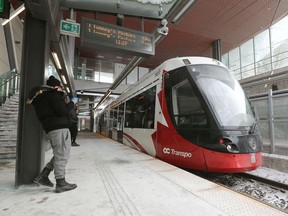During the LRT commission’s investigation, the commissioner, Judge William Hourigan, considered requests that the evidence be kept secret.

article content
The judge overseeing the LRT investigation is not letting claims of confidentiality stand in the way of the commission learning all it can about the Confederation Line’s problems.
Announcement 2
article content
The investigative hearing enters its final week on Monday with eight witnesses scheduled to testify over four days.
The week begins with City Manager Steve Kanellakos giving testimony in the morning, but the last word on Thursday will go to executives from the Rideau Transit Group.
During the LRT commission’s investigation, the commissioner, Judge William Hourigan, considered requests that the evidence be kept secret.
The city of Ottawa was one of the parties trying to withhold reams of documents from the investigation, but Hourigan did not have a sympathetic ear for the city’s call for secrecy.
“In essence, the City’s request is a series of broad claims to suppress documents, unsupported by any compelling factual or legal basis for doing so,” Hourigan wrote in his June 10 decision.
Announcement 3
article content
The city argued that about 1,600 documents, or portions of them, should not see the light of day because they contained sensitive information related to procurement, risk analysis, independent certifier decisions, and findings by Transportation Research Associates, which is the Philadelphia-based firm. contracted to review the return to service of the LRT system after the second derailment last year.
Most of the city’s concerns were about the disclosure of confidential business information.
The city also wanted Stage 2 capital budget information and all term sheets, which are business deals, redacted. On that, Hourigan was open to hearing more arguments. (Under the commission’s mandate, Phase 2 is not part of the investigation.)
Announcement 4
article content
It wasn’t the city’s only request to protect evidence from the public.
The city was concerned about the publication of some WhatsApp group messages and argued that attorney-client privilege and litigation privilege should keep the messages secret.
The commission learned of the WhatsApp chats involving city officials after the city’s consultant, STV, produced the instant messages as part of the evidence disclosure process.
This time, referee Frank Marracco was tasked with making a decision on the city’s request.
In a decision published June 21, Marracco allowed the city to delete phone numbers and personal information from chats, but the arbitrator did not buy the city’s right of privilege. Most of the content of the messages was published.
ad 5
article content
The city wasn’t the only organization hoping to keep the evidence secret during the investigation.
Infrastructure Ontario (IO), a provincial Crown agency, requested that some 2,300 government procurement and advisory documents be made confidential, which would have blocked their release to research participants and the public. The agency proposed allowing only the contestants’ attorneys to view the material.
The commissioner enthusiastically rejected the IO request, noting that such a secrecy order would go against what the investigation was asked to do.
“The Commission is mandated to get answers to the people of Ontario regarding what happened on the Project (Stage 1) and how we can prevent problems from happening again,” Hourigan wrote in his decision.
ad 6
article content
“All participants must be committed to getting those answers, and it must be obvious to them that no solutions will be discovered if thousands of relevant documents are suppressed.”
Rideau Transit Group also made a document-related confidentiality claim for arbitration between its construction arm, Ottawa Light Rail Transit Constructors, and train manufacturer Alstom. Companies wanted their sensitive financial information to be protected from disclosure.
Hourigan allowed the companies to make “reasonable redactions” on the documents.
During the investigative hearing, Hourigan has shown that he does not have time for witnesses to avoid questions or speculate whether the evidence might be confidential.
One notable moment was when city financial consultant Remo Bucci of Deloitte said he had to be careful with his evidence because of “confidentiality.”
Hourigan interrupted the interrogation.
“We are here for a public investigation,” Hourigan said. “We do not hide behind confidentiality. We do not answer questions on the basis that it might be confidential. If there’s a problem with anything you’re saying, someone will let us know, but at this point, you should feel free to answer all questions.”
On the other hand, there have been times when Hourigan or the attorneys have prevented a witness from speaking if the evidence would break attorney-client privilege or enter into ongoing legal disputes.
